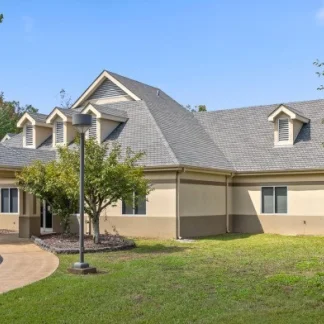Riverwalk Recovery Center
Riverwalk Recovery Center is a private rehab located in Chattanooga, Tennessee. ...
Parkridge Valley - Courage Way is a dual diagnosis mental health and substance use disorder treatment center for adults, located in Chattanooga, Tennessee. The center also provides important community services, including case management, psychiatric care, and community referrals.
Addiction services include mental health assessments and counseling, dual diagnosis rehab, outpatient programs, and medication management.
Mental Health Assessment & Counseling Mental health assessments help staff evaluate clients’ mental health status and addiction severity and any co-occurring disorders. The information is used to formulate an individualized treatment plan, which may include individual, group, and family counseling.
Outpatient Programs Outpatient sessions are run during the day or in the evenings and involve individual and group therapy, educational groups, relapse-prevention strategies, and aftercare planning. Regular outpatient program participants are required to attend once or twice per week. Intensive outpatient treatment involves three to four sessions per week, and partial hospitalization requires daily sessions.
Dual Diagnosis Addiction & Mental Health Treatment This treatment uses evidence-based practices to treat addiction and mental health diagnoses. Offered to adults over 18, dual diagnosis addiction treatment involves an assessment, personalized treatment plan, group work, individual counseling, workshops, and peer support meetings.
Medication Management Psychiatrists can determine if medication may be supportive in a client’s rehabilitation process. This involves an assessment, diagnosis, treatment plan, and medication management. Patients may attend progress appointments, when medication may be adjusted.
Contact us for more information: (423) 894-4220

Connect with Parkridge Valley - Courage Way by calling their admissions team directly.
(423) 894-4220 Website Get DirectionsThe Joint Commission, formerly known as JCAHO, is a nonprofit organization that accredits rehab organizations and programs. Founded in 1951, the Joint Commision's mission is to improve the quality of patient care and demonstrating the quality of patient care.
Joint Commission Accreditation: Yes
Family groups offer support by helping clients and family members increase their understanding of family dynamics and by allowing them to discuss the impact addiction has had on the family. It is very important that the clients have a willingness to stop their addiction. It is encouraged that family members be committed to participating in the recovery process.
Group therapy is any therapeutic work that happens in a group (not one-on-one). There are a number of different group therapy modalities, including support groups, experiential therapy, psycho-education, and more. Group therapy involves treatment as well as processing interaction between group members.
Group therapy is any therapeutic work that happens in a group (not one-on-one). There are a number of different group therapy modalities, including support groups, experiential therapy, psycho-education, and more. Group therapy involves treatment as well as processing interaction between group members.
Riverwalk Recovery Center is a private rehab located in Chattanooga, Tennessee. ...
Cumberland Heights - East Brainerd Road offers local services in Chattanooga for...
Tennessee Community – Counseling Services is a private rehab located in Chattano...
Bechtel Gray Smith – Counseling Center is a private rehab located in Chattanooga...